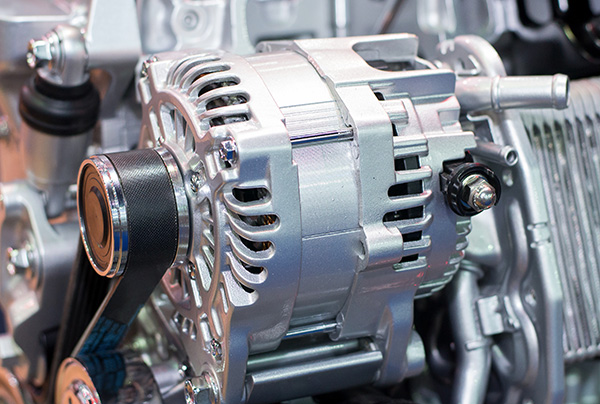
Many drivers assume their battery is doing all the work to power the car, but that’s only half the story. The battery gets your vehicle started, but once the engine is running, it’s the alternator that takes over. It produces electricity to recharge the battery and run everything from your headlights and dashboard to your heated seats and radio.
When the alternator begins to fail, your car loses its main source of power. Even a fully charged battery can only keep things running for a short time before systems start shutting down. This is why spotting early signs of alternator trouble is so important. This way, you protect your entire electrical system and keep your car safe and reliable.
1. Dimming or Flickering Lights
One of the first things drivers notice when the alternator isn’t working properly is a change in their lights. Your headlights might seem dimmer than usual, or they may flicker when you’re idling at a stoplight. Sometimes, as soon as you accelerate, the lights brighten again.
This happens because a failing alternator struggles to produce enough power at low speeds. Without steady voltage, the electrical systems in your vehicle don’t operate at full strength. Ignoring this sign can create real safety risks, especially if you’re driving at night or in heavy rain when visibility is already reduced.
2. A Battery That Keeps Dying
If your car’s battery dies repeatedly, the problem might not be the battery itself. Many people replace their battery only to find that the issue comes back a few weeks later. The reason? The alternator isn’t fully recharging it as you drive.
Instead of guessing, it’s best to have a technician test your charging system. A quick diagnostic check will confirm whether the alternator is delivering the proper output. Catching this problem early not only saves you from buying unnecessary batteries but also prevents being stranded with a vehicle that won’t start.
3. Strange Noises Under the Hood
Pay attention to unfamiliar sounds when the engine is running. A failing alternator can produce noises you might describe as grinding, whining, or even a high-pitched squeal.
The grinding or whining usually comes from worn-out bearings inside the alternator itself, while squealing often signals a slipping serpentine belt — the belt responsible for driving the alternator. These sounds usually start subtle and gradually get louder. If you notice them early, you can address the issue before the belt or alternator fails completely, preventing further damage to nearby components.
4. Electronics Acting Up
Today’s vehicles rely on more electronics than ever before. A weak alternator can create all sorts of strange behavior inside your car. You might notice your radio cutting out, dashboard displays dimming, windows rolling up more slowly than usual, or your climate controls working inconsistently.
These issues often become more obvious when you’re using several electrical systems at once, like when you’re running the A/C, charging your phone, and listening to music at the same time. If you notice multiple small problems occurring simultaneously, it’s a good indication that your alternator may not be keeping up with the demand.
5. Dashboard Warning Lights
Most vehicles are equipped with a battery-shaped warning light on the dashboard, which can appear when the charging system is having problems. While it’s easy to assume this light means the battery is failing, it often signals a bigger issue — the alternator isn’t providing enough power.
In some cases, you may also notice other warning lights flicker on and off. Systems like ABS, traction control, or stability control can act up when the alternator’s output becomes inconsistent. These systems depend on steady voltage to function correctly, so any fluctuation can confuse the sensors and trigger alerts.
6. Engine Performance Problems
A struggling alternator doesn’t just affect your lights and electronics — it can affect how your car drives. Modern engines rely heavily on a consistent flow of electricity to manage fuel delivery, ignition timing, and emissions. When the alternator can’t supply enough power, you might notice rough idling, hesitation when accelerating, or even stalling.
In more serious cases, your vehicle may enter a reduced power mode, sometimes called “limp mode,” to protect itself from further damage. Driving like this isn’t just inconvenient; it can be unsafe, especially in heavy traffic or on the highway.
Stay Ahead of Alternator Trouble With Aurora AutoPros
If you’ve noticed dimming lights, odd noises, warning lights, or any other signs of alternator trouble, don’t wait until you’re stranded on the side of the road. At Aurora AutoPros in Aurora, CO, our team uses advanced diagnostic tools to test your alternator, battery, and entire charging system. We’ll pinpoint the exact cause and recommend the right repair to keep your car reliable and ready for the road.
Schedule your appointment today and drive with confidence knowing your vehicle’s electrical system is in expert hands.